What is really possible in the realm of normal human beings our age? How adaptable are we? Do we have strengths and adaptations we have yet to uncover? Invariably the answer is that we have massive reservoirs of strength and the tremendous mutable capacities that are beyond our wildest imaginations. Joan MacDonald who utterly transformed her body at age 70, Kien Vuu who pulled himself out of certain diabetes, and now Patricia who has become a frigid water swim enthusiast. By frigid, I mean the water is cold enough that it starts to take on the characteristics of almost freezing to a solid. How does a svelte woman from the deep sweltering heat of Brownsville, Texas, a devotee of all things Greece and Mediterranean, end up swimming in the North Atlantic in winter and liking it? She doesn’t even like the cold.
Patricia spent 20+ years in the ad agency trenches of Manhattan. A few years ago, she and her partner relocated out of the world to live in the quiet on the North Fork of Long Island. A devoted traveler her entire life, she has been the AGEIST travel editor for the last 2 years. As a co-worker and a friend, we thought we knew her well. Then, as we watched her Instagram feed this last year, we found that she was up to something very special. In November, when the water was a toasty 50 degrees, we marveled at her daily swimming. When the snow began to appear in the photos we were duly impressed and, truthfully, a bit concerned. What are you doing? How is this possible? Normal humans this side of Wim Hof can’t do this sort of thing for more than a couple of minutes, and you are taking long swims? Label us impressed, of Patricia, in particular, and of the ability for seemingly anyone to do this.
“I started small with a few hundred strokes and ended up swimming a few miles across coves”
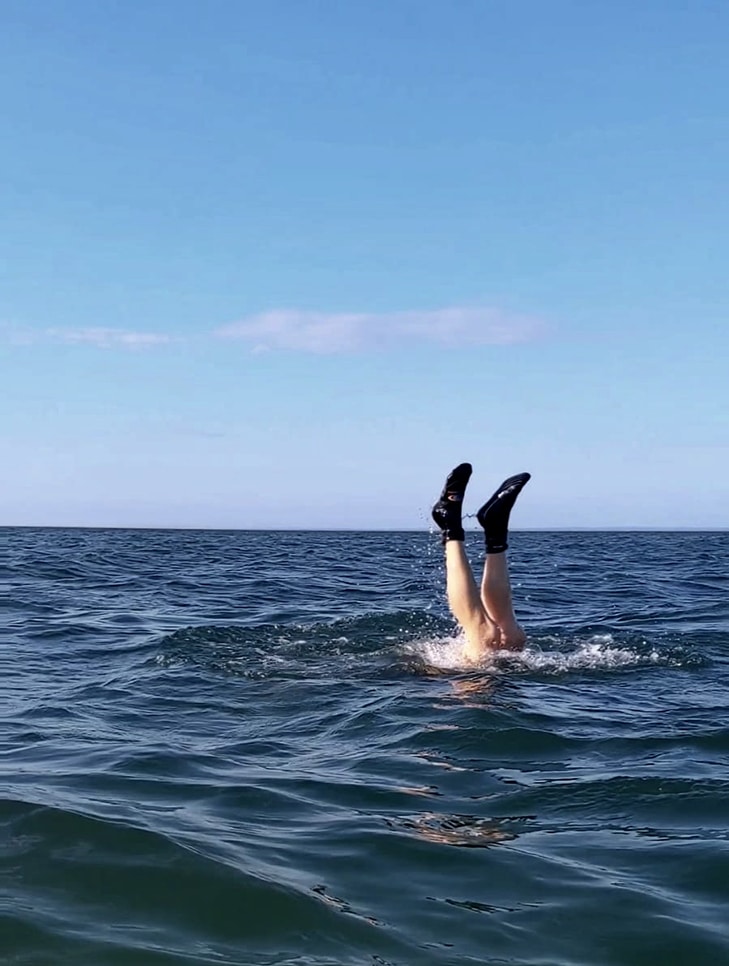
How long have you been ocean swimming?
I started open water swimming when I was living in Greece, creating my art installations for an exhibition (2017). The swims started as a fun break in the day — I was living on the Aegean, how could I not swim! My swims grew, and then turned into a daily ritual. Each day I told myself that all I had to do was go a little longer than the day before. I started small with a few hundred strokes and ended up swimming a few miles across coves. When I got back home I thought, “This how I want to live. I want to swim every day. How can I design a life to make this possible?”
I’m on the North Fork of Long Island now. It’s not Greece. But it is. In essence.
Why do you do this?
It’s my connection to nature, fitness, self-care, resilience training, and happy place all rolled up into one. Everyday rituals are very powerful. For me, it’s my swim. I didn’t set out to be a winter swimmer, but I did set out to swim every day. Which means, when winter got here, my commitment had to ratchet up. My swim has become my holding space for expanding what the body knows, inner quiet, presence only to water and breath. There is something about placing a goal or ritual in your body. That’s what time (and repetition) does. And that’s where the magic lies.
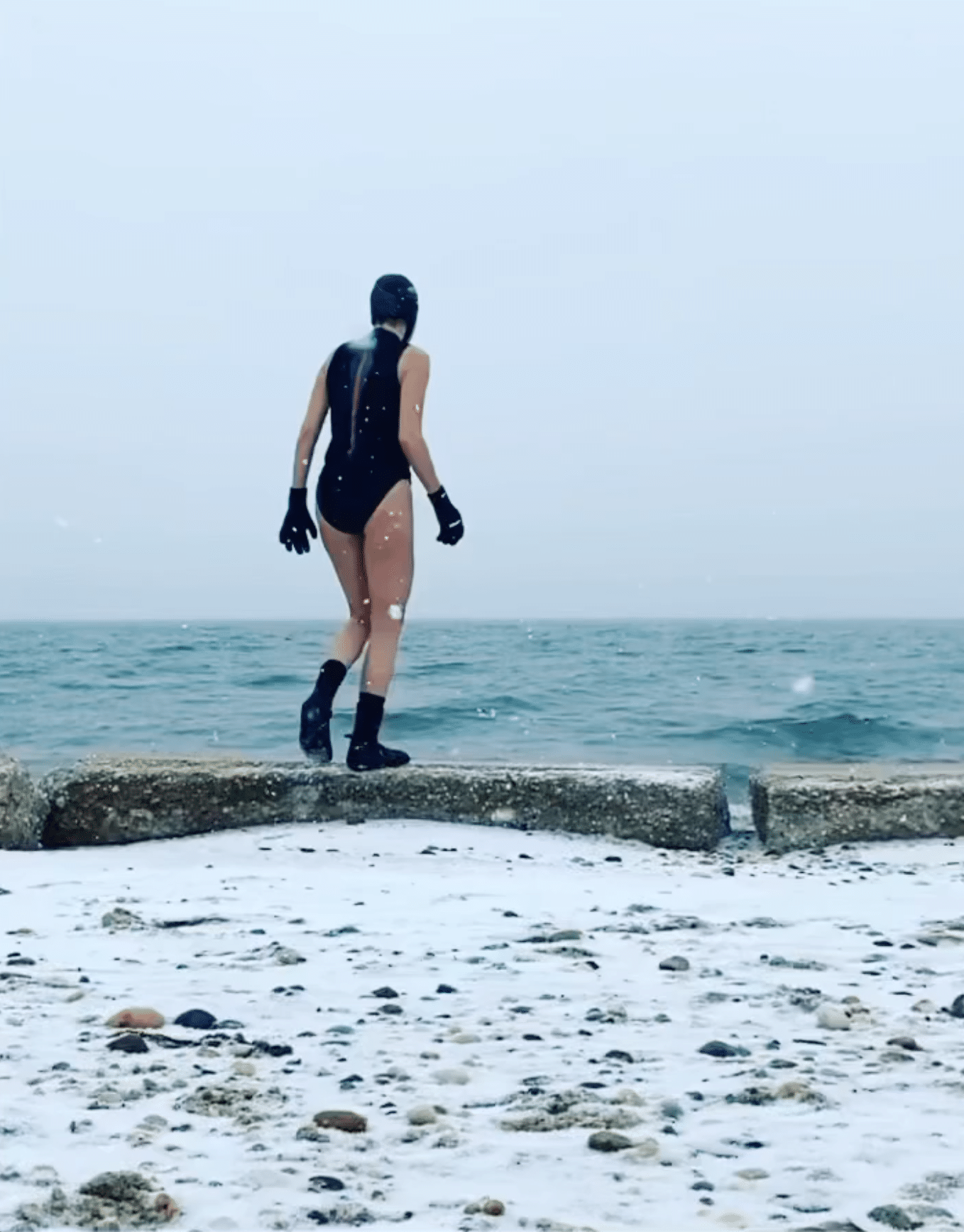
“I didn’t set out to be a winter swimmer, but I did set out to swim every day”
What changes have you noticed in your body since you have been cold water swimming?
The biggest change for me is stamina. Both mental and physical. Fulfilling on the commitment to swim every day no matter what is very satisfying. Your central nervous system loves doing what you said you were going to do. Physically, believe or not, I don’t like cold. I really, really dislike it, actually. But I’ve noticed that I heat up faster now. There’s science to this; your body develops more brown fat, a kind that’s good to have. Also, my immune system has always been not so great. This winter, though, I’m solid. Just one cold, and it lasted only 24 hours.
*A note. To me, swimming every day no matter what isn’t about daring nature. It’s about having a relationship with it. The sea can be a dangerous place. I respect that.
What was the water/air temp today?
Air 37, Sea 35.6, Wind South 7 mph. The coldest the water has ever been here on the North Fork of Long Island is 30 degrees, in 2015. Arctic swims are usually at 32 degrees.
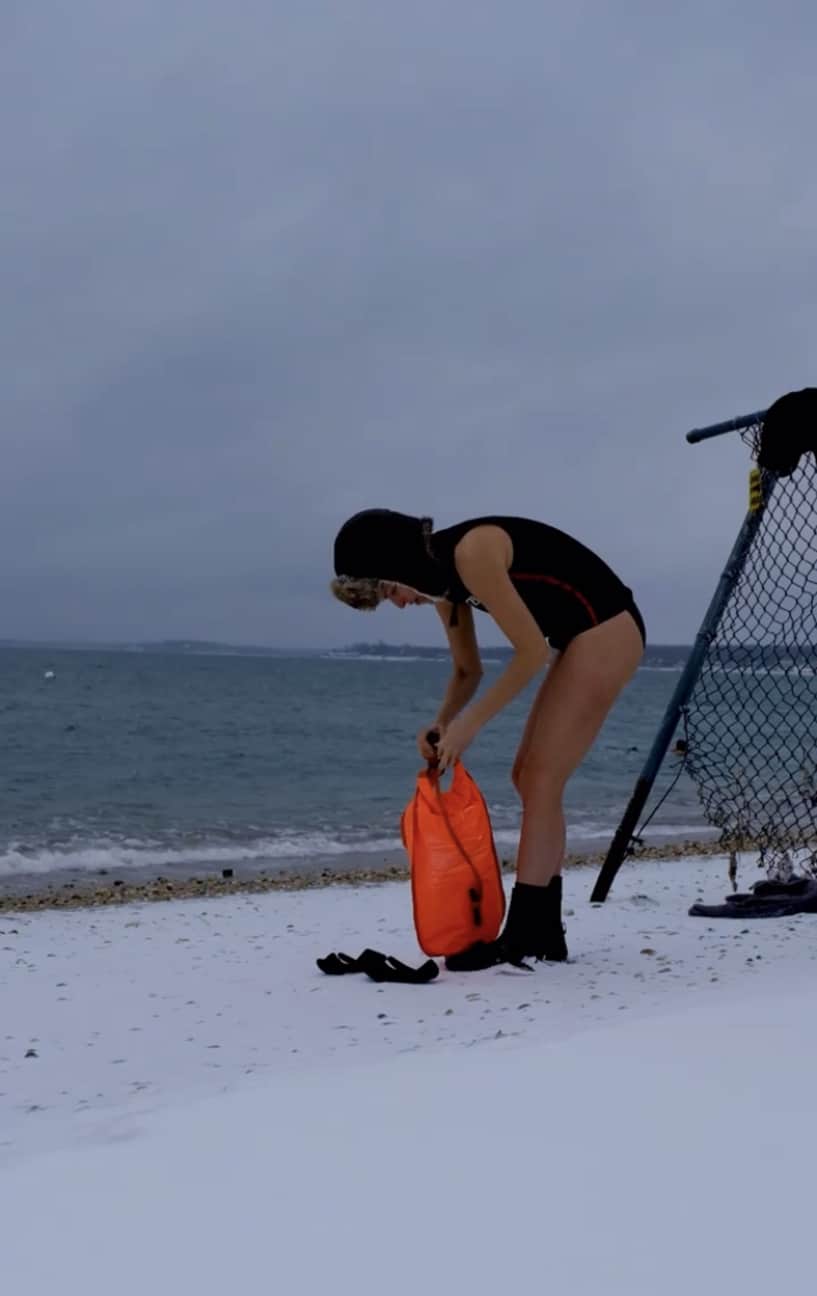
“Winter water sounds different than summer water. Everything seems heightened and crisp”
How would you describe the difference of the water experience as you are getting into these very cold temperatures?
Getting to know winter water has been fascinating. I’m considering my first full-year swim cycle an apprenticeship. Winter water moves more slowly, and there is a rolling crackling that’s loud and echoing even through earplugs. Winter water sounds different than summer water. Everything seems heightened and crisp. Cold molecules move slower than warm molecules and vibrate at a lower frequency. From inside the water, an airplane passing overhead sounds like it is far away, and nearby, and occupying the whole sky. I love listening to water.
How does your body react to the cold water?
In the early days, I was extremely present to the cold — it really does literally take your breath away and wipe away any other thought in your brain (this part I still like). And there have been days that I have had to run home on ice-block feet. But I’ve learned to be more skillful. Over time, the cold is not the lead sensation. It can be sharp and tingly, but that gets familiar, pleasant even, and you get to know your edges. What remains is this intense invigoration and snap into focus. A day is always better after a cold swim.
Do you ever get frightened out there?
Yes, sometimes. But I play it safe, especially with freezing water. You don’t have much time if something goes wrong so I don’t put myself in silly situations. I over-stayed once. I was swimming along with thinking, “Wow, I’ve gotten good at this, I hardly feel anything.” Then the lightbulb went off: I don’t feel anything. I couldn’t move my fingers. This was stupid on my part, but such an easy mistake to make. This swim changed all of my future swims. I stay well within the threshold, and I always have an exit strategy.
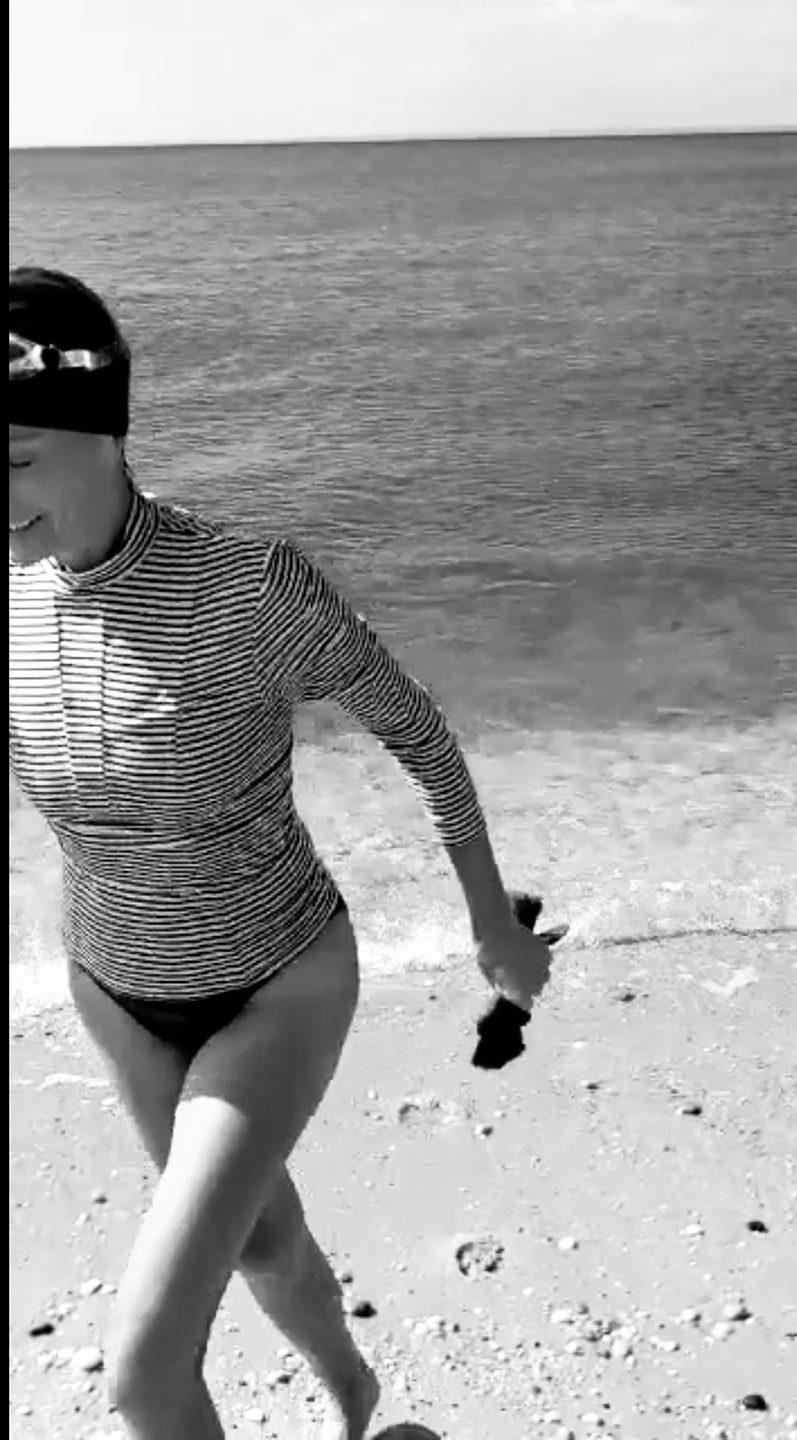
Pre-Swim Prep
Do you do any pre-swim prep to get your body ready?
I live about a mile from my favorite swim spot. I run there, which warms me up. I also practice a yogic breathing technique called “breath of fire.” I also have a personal meditation I do every day before entering the water.
How long do your swims last?
February swims ranged from 10-18 minutes if I’m skin-only (no wetsuit). About 30-45 minutes in a wetsuit.
What is the most difficult part of the experience?
Gauging the cold threshold, and getting home. After I get out of the water, I need to get the one-mile home. I have all kinds of strategies to warm up as quickly as possible. Your body loses heat 25x faster when wet.
Do you experience any sea life when swimming?
In the winter, not so much. There is a magnificent crane that sits out in the sea on the same rock every day. We also have a few eagles that you can see from the water when you look back to land.
Go-To Gear
What sort of gear are you wearing?
My go-to gear: TYR swimsuit, a Zone 3 thermal vest, and Blue Seventy swim socks, gloves, and hat. I love swim hats. In February, I also added booties. When it’s windy, or when I want more time in the water, I add a wetsuit. Oh, and ear plugs. And most importantly, a bright orange swim buoy, which keeps you visible in the water. My swim buddy brought it to my attention, and I’m hugely grateful.
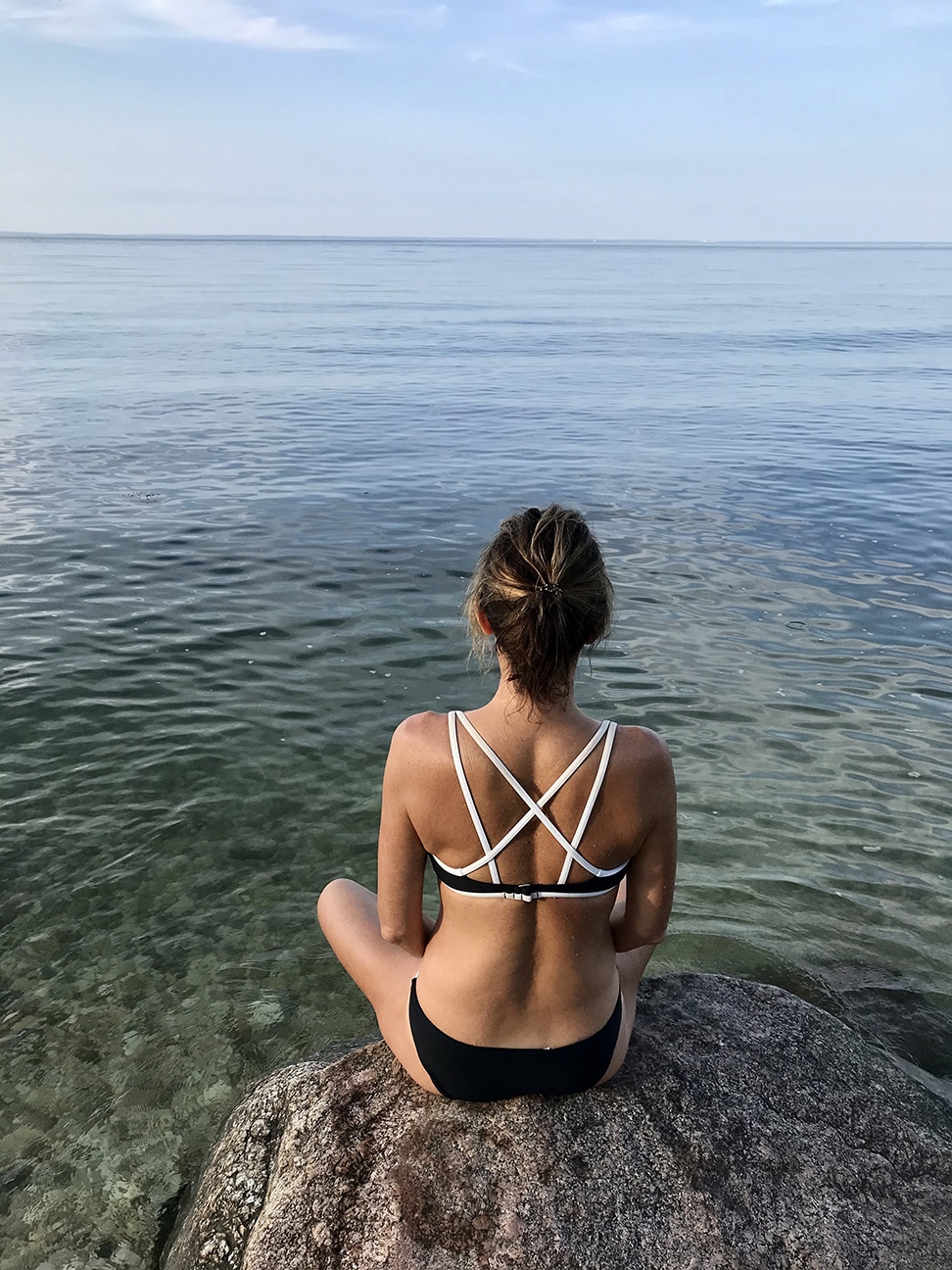
Do you have others that you do this with or are in contact with about cold water swimming?
Yes! Swim buddies are magical beings. I have two buddy-systems that have kept me in the water. My local buddies, who have been cold water swimming in the Long Island Sound for more years than me. Unstoppable.
I also have a long-distance swim buddy who is my mentor and spirit guide. A mutual friend introduced us (virtually), and she has taken me under her wing from the beginning in the most wonderful way. Early on, she would send me gentle prompts like, “What are the dynamics of the tide where you swim?” or “Please consider a tow-float for visibility.” She walked me in to this entirely new world.
How do regular people react when you tell them about this?
Cold water is pretty universally off-putting. Mostly people cringe or get worried. But I consider myself regular people. Cold water swimmers or ‘wild swimmers’ aren’t always super fit athletes or adrenaline junkies. Some are, but most aren’t. We are regular people, all weights, sizes, and fitness levels. The call is something different. Most of us, though, are women. My partner cold swims every day, too. He is the only guy I know who does this out here.
Where to Start
If someone wanted to do this, how would they start?
Slowly. You don’t want to start cold water swimming in February. If you are going to, start with a count of three or five breaths in the water, and build gradually from there. And get a buddy. The body will acclimate, but not all at once. For me, the most important thing is to have a relationship with the water. The desire to visit it every day, plus a knowledge of its currents, tides, etc. If you love being there, there are just so many riches to cold water swimming, a.k.a. swimming all year round.
The Intel
Follow Patricia’s frigid swims on Instagram.
Join Patricia in Greece this fall.
See Earth is a she, the installation she created while living (and swimming) in Greece.
LEAVE A REPLY
The ideas expressed here are solely the opinions of the author and are not researched or verified by AGEIST LLC, or anyone associated with AGEIST LLC. This material should not be construed as medical advice or recommendation, it is for informational use only. We encourage all readers to discuss with your qualified practitioners the relevance of the application of any of these ideas to your life. The recommendations contained herein are not intended to diagnose, treat, cure or prevent any disease. You should always consult your physician or other qualified health provider before starting any new treatment or stopping any treatment that has been prescribed for you by your physician or other qualified health provider. Please call your doctor or 911 immediately if you think you may have a medical or psychiatric emergency.

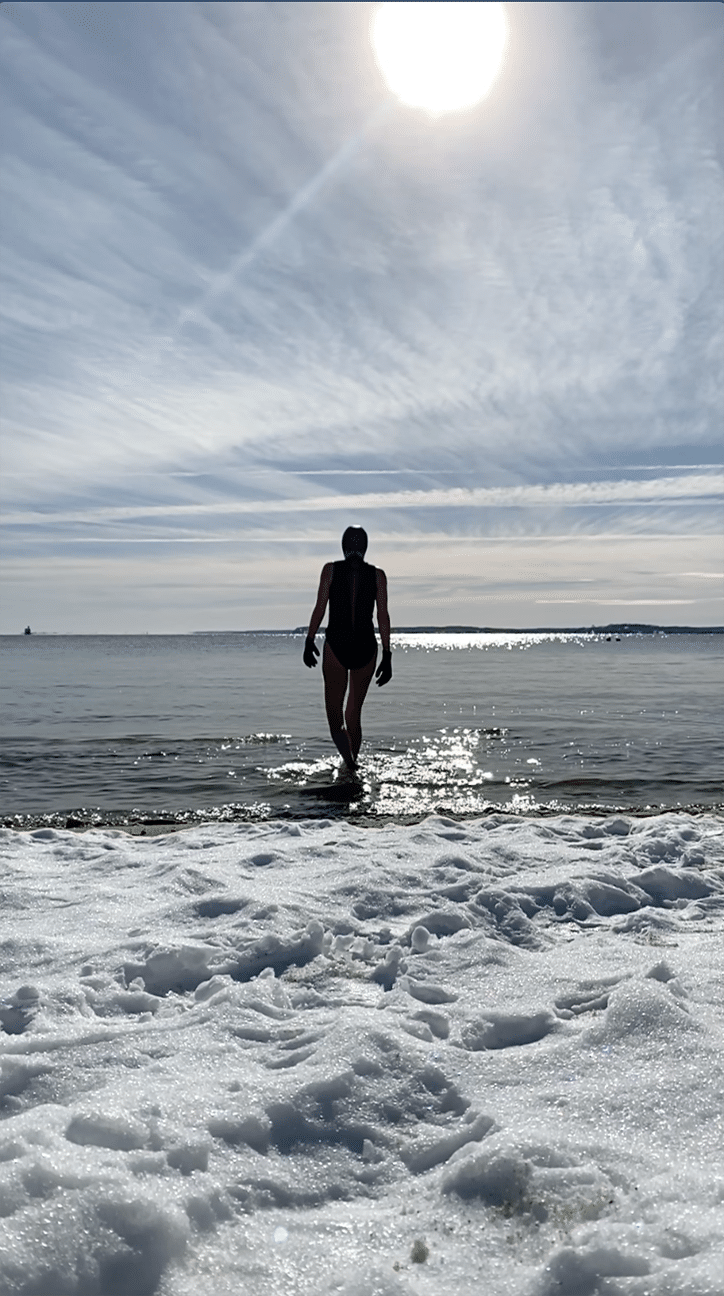


Love this story!! Hugely inspiring. I swim regularly and wish I had access to the sea year round. This makes me think I should make it a priority to live near the ocean.
So inspiring! Love the line “Your central nervous system loves doing what you said you were going to do”.
Ditto to Helene and Maggie. With the pandemic, my regular swims in a local pool were suspended and the last swim I did was in open water, exactly a year ago. This wonderful piece has inspired me to try to make this possible for the next chapter in my lift too. Such powerful images Patricia has given us here.
Hi Deb, Thanks! And huge apologies for the delayed reply! I hadn’t seen this before. Hope you are having beautiful swims.
Fantastic article! Very inspiring!!! I’m a beginning open-water swimmer and I’ve learned a thing or two from this piece. Thank you!
Hi Lina, Thanks! Checking in …. How is your open water swimming coming along? I hope you are loving it, and happy to encourage or help in any way.